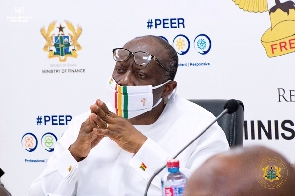 Ken Ofori-Atta, Finance Minister-nominee
Ken Ofori-Atta, Finance Minister-nominee
As expected, Ghana will this week begin the final process to raise up to US$5 billion from the international capital markets in the form of Eurobonds.
Finance Minister Ken Ofori-Atta – who is currently receiving medical attention in the United States over COVID-19 related complications – had announced government’s intention in October 2020 to issue a record high volume of Eurobonds early this year, indicating that the issuance could happen before the end of the first quarter as it seeks to close its 2021 budget financing gap.
The revelation by a top Finance Ministry official to Bloomberg last week that it will commence a roadshow to market the impending issuance suggests that this time table is still being adhered to.
Interestingly, the Ministry claims it will be marketing US$5 billion in Eurobonds, which is the upper limit of the range of between US$3.5 billion and US$5 billion announced last year. At that time the Ministry said the actual amount would depend on market conditions at the time of issuance and even now government reserves the right to lower the amount it will issue below the maximum announced.
This is because only about US$2 billion is meant for financing the 2021 budget deficit, now expected to be about 9.5 percent of Gross Domestic Product, down from 11.7 percent in 2020. The rest is for ‘liability management’ which means restructuring of the public debt. If Ghana can secure investors for the impending bond issuance at coupon rates lower than some of its already issued bonds it would use proceeds from the latest issuance to buy them off. This is a most likely prospect; the highest priced Ghana Eurobonds were issued at an expensive 10.25 percent and it also has billions of dollars worth of cedi denominated bonds in issuance with coupon rates of over 19 percent – those high rates meant to comfort foreign investors against the possibility of foreign exchange losses due to cedi depreciation. With the cedi having been relatively stable over the past year and strong indications that this stability will continue over the medium term, Ghana can now afford to reduce the cost of its cedi denominated medium term bond debt.
On the upside, the successful recent issuance of Eurobonds by Cote d’Ivoire in December 2020 – the first issuance by a sub Saharan African country since COVID 19 erupted across the continent early last year – suggests that a new issuance by Ghana, which is traditionally one of the favourite sovereign bond issuers among international bond investors, will be well received. On the downside though, Ghana’s exceeding the generally accepted public debt to GDP ratio of 70 percent (Ghana’s ratio by the end of the year is estimated at about 76 percent) will make investors wary and could persuade them to demand significantly higher coupon rates than has been the case over the past few years. If that happens Ghana may decide not to issue the full US$5 billion even if the demand is there.
For the first time, Ghana’s roadshow to market the issuance would be held virtually due to coronavirus restrictions, said the officials, who declined to be named because they are not authorized to speak publicly on the matter.
This would be the first time Ghana will hold virtual meetings with investors prior to an international debt sale.
Ghana intends to raise foreign financing this year through Eurobonds, diaspora bonds, sustainable bonds as well as syndicated/bridge loans, the ministry says, although the bulk is expected to come through Eurobonds.
Ghana has mandated Bank of America, Citigroup Inc., Rand Merchant Bank Ltd., Standard Chartered Plc, and Standard Bank Group as lead managers for the programme. It has also named Accra-based Cal Bank Plc, Fidelity Bank Ltd., IC Securities Ltd., Databank Group, and as co-arrangers, the official said.